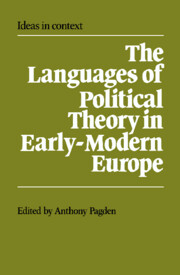Book contents
- Frontmatter
- Contents
- Notes on contributors
- Acknowledgements
- Introduction
- 1 The concept of a language and the métier d'historien: some considerations on practice
- PART I
- 2 The history of the word politicus in early-modern Europe
- 3 Civil science in the Renaissance: the problem of interpretation
- 4 Dispossessing the barbarian: the language of Spanish Thomism and the debate over the property rights of the American Indians
- 5 The ‘modern’ theory of natural law
- PART II
- PART III
- PART IV
- Index
- Ideas in Context
3 - Civil science in the Renaissance: the problem of interpretation
Published online by Cambridge University Press: 04 September 2009
- Frontmatter
- Contents
- Notes on contributors
- Acknowledgements
- Introduction
- 1 The concept of a language and the métier d'historien: some considerations on practice
- PART I
- 2 The history of the word politicus in early-modern Europe
- 3 Civil science in the Renaissance: the problem of interpretation
- 4 Dispossessing the barbarian: the language of Spanish Thomism and the debate over the property rights of the American Indians
- 5 The ‘modern’ theory of natural law
- PART II
- PART III
- PART IV
- Index
- Ideas in Context
Summary
‘Interpretation’, like its modern descendant ‘Criticism’, has often come under attack by champions of authorship and authority. From Petrarch to Susan Sontag, authors have taken stands ‘against interpretation’ as a way of protecting the creative process from scholastic instrusions and distortions – and even, as in current ‘deconstructionist’ criticism, from usurpation of the authorial role. Both sides are certainly aware that the struggle is in part political (even on that lowest level of interpretation, which is translation: ‘traduttore, traditore’); for it centres on the meaning, hence control of the social effects, of the work in question.
This time-honoured war between authors and critics has a striking (and much more political) counterpart in the field of law, which has paralleled (and often overlapped) Western literary history. From Justinian, who gave shape to the European legal tradition, to Napoleon, who reshaped it for the modern world, ‘authorities’ and ‘interpreters’ have been at odds, if not sword's point; for here the prize is the political and social control embodied in the law and in the attendant authority to define and to apply it – in effect sovereign power. Cuius interpretatio, eius legislatio. Both of these emperors, therefore, strictly forbade any ‘interpretation’ at all. Their efforts were in vain, of course; and the logomachy still goes on – critics versus authors, interpreters versus legislators, judiciary versus executive, perhaps even practitioners of civil disobedience versus government.
- Type
- Chapter
- Information
- The Languages of Political Theory in Early-Modern Europe , pp. 57 - 78Publisher: Cambridge University PressPrint publication year: 1987
- 1
- Cited by



